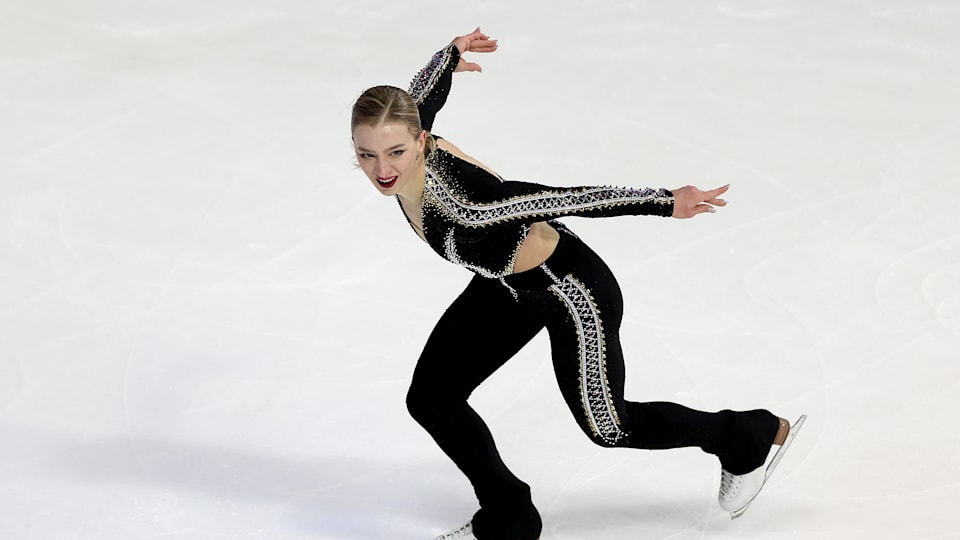
Figure skater Amber Glenn has never fit in her sport’s box. And she’s celebrating that today more than ever.
The 24-year-old Texas native is one of the few women in the sport to own a triple Axel, and last season – nine years after she was the American junior champion – she made her debut at the World Championships, finishing 12th.
Glenn has over 1.5 million followers on TikTok who follow her as much for her skating tricks and flips as they do for her humour and candor. She’s a proud member of the LGBTQ+ community – and has also been outspoken when it comes to issues surrounding mental health, including body image and expectations for females in skating.
“As a junior athlete, I had crises that were overlooked in order for me to ‘do my job,’” Glenn explains in an exclusive interview with Olympics.com. “I struggled in silence until eventually everything fell apart. Since then, I’ve refused to let my mental health deteriorate for short-term success.”
She continues: “In the beginning, I felt so alone and if I had these challenges that I could never be one of the top skaters in the U.S. I want to show young athletes that isn’t true.
“Many people have some sort of battle or challenge going on – but you have no idea they’re going through that.”
Amber Glenn: 'I'm the only one on the ice'
At Skate America – the ISU Grand Prix – last month, Glenn became just the sixth U.S. woman to land a triple Axel in international competition. Her family was in the arena, the crowd roaring as Amber made history – and looked poised to win a second career Grand Prix medal.
Then things unravelled.
“I never had the adrenaline experience of landing it in competition,” Glenn told reporters after. “It is one thing to visualise it and the other to experience it.”
It was a learning experience, however, for Glenn, who made her senior debut back in 2015.
“I’m still aiming to learn and improve as a competitor as I gain more and more experience,” she says to Olympics.com. “Over the years I’ve gotten better about treating competitions all the same: There could be 100 people or 10,000 – either way I’m the only one out there on the ice.”
It’s one of the many learnings Glenn has taken on board as she’s matured on the ice and off of it. That goes as much for her triple Axel-jumping body as it does for the mind that helps her complete that history-making jump.
“Now I feel as though I treat myself with more kindness and look at adversity and challenges with a more open-minded approach.”
“When I was younger, it was definitely more of a ‘get-your-job-done-at-all-costs’ mindset,” she says. “That led me to have mental crises – and injuries that weren’t properly addressed for a long period of time.
“Because of that, the result was more substantial than if it had been handled properly and with more care in the first place.”
Glenn on mental health as a human right
Glenn has persevered in a sport where many are retired by her age. Because of that, her maturity and breadth of experience have allowed her to tackle issue after issue – both the big and the small.
“[I’ve learned] it’s not about ‘what can I do right now,’ it’s about ‘what should I do,” she says, discussing a recent setback she faced when she got injured in practice, resulting in a black eye.
“For many athletes it’s a struggle to not rush through the recovery process to get back to the normal,” she continues. “But as I get older, the more important thing is to do things the right way.”
That “right way” has also included body image, positivity and an openness around disordered eating, which still casts a long, dark shadow over figure skating.
“I’ve seen much, much progress over the years but there’s still a lot to improve upon,” Glenn says.
“I still struggle with body image because of the years of feeling like I had to look a certain way to be accepted in the elite skating community,” she adds. “Now I focus on what my body can do; how I feel day-to-day. I’m an athlete, not a model – I love my body for what it can do, not for what others think of it.”
October 10th marked Mental Health Day, with this year’s theme being "mental health as a universal human right."
How does Glenn interpret that?
“I interpret that as whoever you are, whatever your identity, sexuality,” she replies. “You deserve the chance to have peace in your own mind.”
